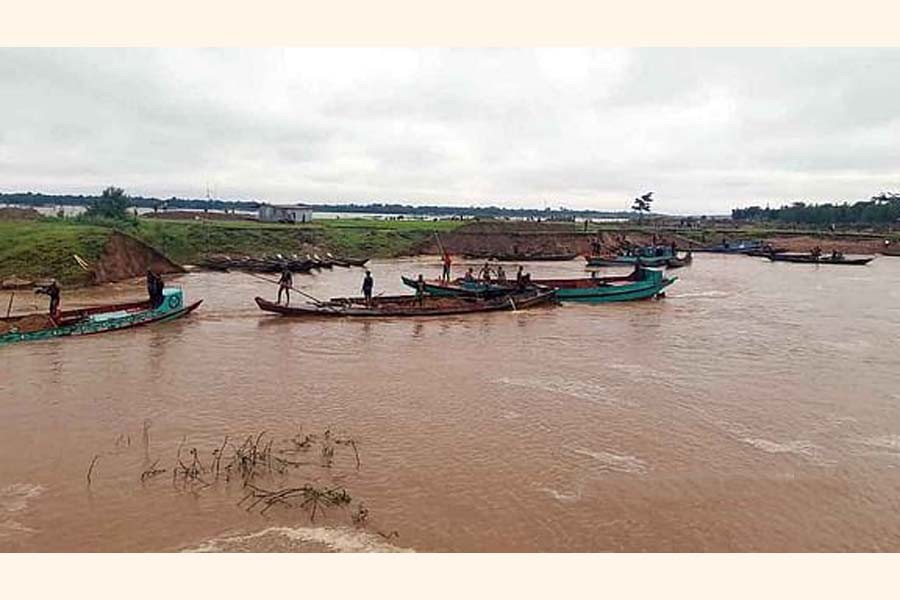Illegal sand extraction: Villages along Jadukata River at risk of losing land, homes

Published :
Updated :

More than two dozen villages along the Jadukata River in Sunamganj's Tahirpur are at the risk of losing their land and homes to illegal sand collection, reports bdnews24.com.
Lessees use unauthorised dredgers, while individuals even dig the banks of the river, villagers said.
They alleged politically influential people back the perpetrators, who on several occasions attacked, threatened or harassed villagers by filing cases against them.
"We're helpless against the sand-eaters. The river was one kilometre wide but now it is 3 kilometres just because they dug up the banks," said Rafiqul Islam Uddin, a resident of Binnakuli village.
The government has leased out a 500-acre area to two firms for sand collection from the middle of the river only, not the banks, at Tk 686.5 million.
The companies - Shohag Enterprise, owned by Ratan Mia, and Khandaker Manzur Ahmed's company Araf Trade Corporation Ltd - are supposed to use traditional equipment like manual digging, buckets, or shovels for the sand collection.
But instead, they use dredgers, impacting the flora and fauna and preventing the natural flow of the river posing a greater threat to the entire area, according to environmentalists. Locals protested against the excavation of stones and pebbles while the authorities leased out the area to excavate sand only.
Sometimes, mobile courts of the Upazila administration visit the sites and fine the lessees or seize their equipment.
But most people call it a "show off".
"The Jadukata River is simply being destroyed in the name of lease. If we don't stop digging out the riverbanks, at least 20 villages will be eliminated," said Tahirpur Upazila Parishad Chairman Karuna Sindhu Chowdhury.
"Many people in these villages lost their homes. If this [sand digging] continues, the entire region including Tahirpur Upazila will be affected. It is damaging the environment."
The Jadukata River originates in the Khashia hill area of the Indian state of Meghalaya.
It enters Bangladesh through the northeast end of Tahirpur Upazila.
Filled with natural beauty, the river also possesses huge water resources.
Sand, pebbles and stones are carried by the strong current from Meghalaya and accumulate in the riverbed.
The local administration has been leasing out the two sites for excavation of sand and stones since the 1980s.
The government, however, banned stone excavation in 2009 as it was quite damaging for the environment.
According to the rules, sand must be excavated from the middle of the river or the flowing part of it.
The riverbanks cannot be damaged under any circumstances and any equipment that damages the environment cannot be used.
But it requires more time to excavate sand from the middle of the river manually as the water is very deep there, said Saharul Islam, a resident of the Ghagtia Adarsha village.
"The demand for the sand collected from the riverbed in the middle is low. Hence, the collectors start to dig out the banks when the water level goes up," he said.
The sand collectors dug a canal at one side of the Ghagtia Adarsha village and used it to row tiny boats and collect sand and stones after excavating the banks, he said.
"We're very much worried about our homes. The 100 families living in this village may get engulfed by the river at any time."


 For all latest news, follow The Financial Express Google News channel.
For all latest news, follow The Financial Express Google News channel.